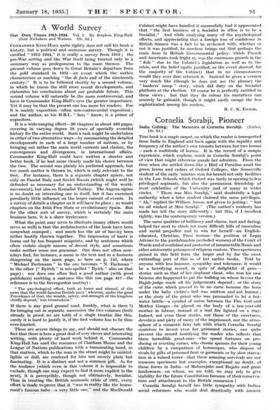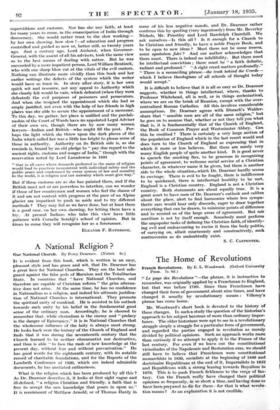Cornelia Sorabji, Pioneer
Tins book is a magic carpet, on which the reader is transported from India to England and back again with the rapidity and frequency of the author's own transits between her two homes —each a multitude of homes. It is the record of a unique experience, which explains much in Cornelia Sorabji's point of view that might otherwise puzzle her admirers. From the time when she settled down like a Bird of Paradise amid the green lawns and cedars of Oxford Colleges, this Somerville student of the early 'nineties won for herself not only facilities in the Law Schools which Oxford was tardy in opening to less privileged aspirants, but also the permanent friendship of most celebrities of the University and of many in wider circles. " There was Miss Sorabji," said doubtfully a legal authority when a later student claimed the same privileges. " Ah," replied Sir William Anson, not given to jesting: " but we all winked at Miss Sorabji." (The author's modesty has made her tell the story differently ; but this, if I recollect rightly, was the contemporary version.) The same qualities of brilliancy and charm, tact and daring, helped her next to climb yet more difficult hills of masculine and racial prejudice and to win for herself—an English- educated, Christian, Parsi woman—the position of Legal Adviser to the purdahnashin (secluded women) of the Court of Wards and of confidant and protector of innumerable Ranis and other aristocratic prisoners of religious custom. The experiences gained in this field form the larger and by far the most enthralling part of this as of her earlier books. Told by anyone with less humour, sympathy and tolerance, it would be a horrifying record, in spite of delightful—if grim— stories such as that of her elephant client, who won his case because she happened to pat the bulldog on whose favour the Rajah-judge made all his 'judgements depend ; or the story of the curse which proved to be no curse because the bone under the baby victim's bed was mutton and not human ; or the story of the priest who was persuaded to let a hot- water bottle—a symbol of union between the Fire God and Mother Ganges—be placed on the body of a ten-year-old mother in labour, instead of a real fire lighted on a tray. Indeed, not even these stories, nor those of the sweetness, devot-ien and piety of many of the imprisoned, nor the atmo- sphere of a romantic fairy tale with which Cornelia Sorabji contrives to invest even her grimmest stories, can quite prevent the record horrifying the reader who reflects that these incredible great-ones—who spend fortunes on pro- ducing or averting curses, who choose spouses for their young children by a comparison of horoscopes, who dispose of rivals by gifts of poisoned fruit or garments or by slow starva- tion in a ruined tower—that these amazing survivals are not museum specimens but examples, exceptional no doubt, of those forces in India—of Maharajahs and Rajahs and great landowners—on whom, we are told, we may rely to give Stability for the future Constitution because of their conserva- tism and attachment to the British connexion I Cornelia Sorabji herself has little sympathy with Indian social reformers who would deal drastically with ancient
superstitions and customs. Nor has she any faith, at least for many years to come, in the emancipation of India through democracy. She would rather trust to the slow Working—
by her own showing, how slow !—of education and progress controlled and guided as now or, better still, as twenty years ago. Just a century ago, Lord Amherst, when Governor- General, with the assent of all his advisers, took the same view as to the best means of dealing with suttee. But he was succeeded by a more impatient person, Lord William Bentinek; Who with one sharp blow cut at the vitals of the evil custom. Nothing can illustrate more vividly than this book and her earlier writings the defects of the system which the writer would have us trust in. In story after story, it is her own quick wit and resource, not any appeal to Authority which she clearly felt wouldbe vain, which defeated (when they were defeated) the evil purposes of poisoners and persecutors. And when she resigned the appointment which she had so amply justified, not even with the help of her -friends in high plates was she able to secure the appointment of a successor. To this day, we gather, her place is unfilled and the purdah- nashin of the Court of Wards have no appointed Legal Adviser of their own sex, though there are by now many women
lawyers—Indian and British—who might fill the post. Per- haps the light which she threw upon the dark places of the India which called her was a little too bright to please some of those in authority. Authority on its British side is, as she reminds is, bound by an old pledge to " pay due regard to the
ancient rights, customs and usages of India," though with the reservation noted by Lord Lansdowne in 1891
" that in all cases where demands preferred in the name of religion would lead to practices inconsistent with individual safety and the public peace and condemned by every system of law and morality in the world, it is religion and not morality which must give way."
But if these customs are as she has painted them, and if the British must not or are powerless to interfere, can we wonder if those of her countrymen and women who feel the shame of it and are not content with progress at the pace of an Alpine glacier are impatient to push us aside and to try different methods ? They may fail as we have done, but at least there is a good case, on her own showing, for letting them have a try. At present Indians who take this view have little patience with Cornelia Sorabji's school of opinion. But in times to come they will recognize her as a forerunner.
ELEANOR F. RATHRONE.







































 Previous page
Previous page